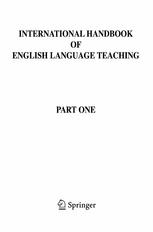

Most ebook files are in PDF format, so you can easily read them using various software such as Foxit Reader or directly on the Google Chrome browser.
Some ebook files are released by publishers in other formats such as .awz, .mobi, .epub, .fb2, etc. You may need to install specific software to read these formats on mobile/PC, such as Calibre.
Please read the tutorial at this link: https://ebookbell.com/faq
We offer FREE conversion to the popular formats you request; however, this may take some time. Therefore, right after payment, please email us, and we will try to provide the service as quickly as possible.
For some exceptional file formats or broken links (if any), please refrain from opening any disputes. Instead, email us first, and we will try to assist within a maximum of 6 hours.
EbookBell Team

4.3
68 reviewsThis two-volume handbook provides a comprehensive examination of policy, practice, research, and theory related to English language teaching (ELT) in international contexts. Nearly 70 chapters highlight the research foundation for the best practices, frameworks for policy decisions, and areas of consensus and controversy in the teaching and development of English as a second and/or additional language for kindergarten through to adult speakers of languages other than English. In doing so it problematizes traditional dichotomies and challenges the very terms that provide the traditional foundations of the field. A wide range of terms has been used to refer to the key players involved in the teaching and learning of the English language and to the enterprise of English language teaching as a whole. At various times and in different contexts, the following labels have been used in countries where English is the dominant language to describe programs, learners, or teachers of Enghsh: English as a second language (ESL), English as an additional language (EAL), limited English proficient (LEP), and English language learners (ELL). In contexts where EngUsh is not the dominant language, the following terms have been used: English as a foreign language (EFL), English as an international language (EIL), and English as a lingua franca (ELF).